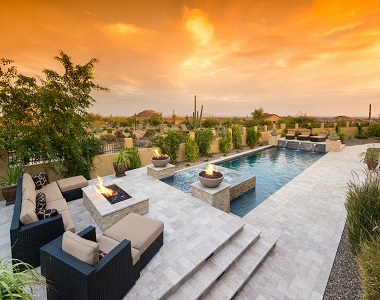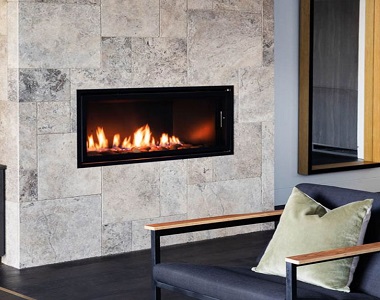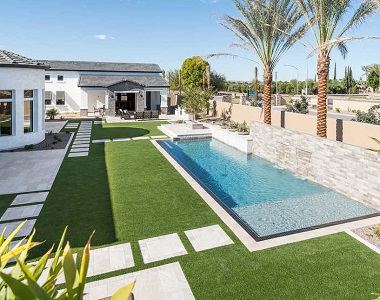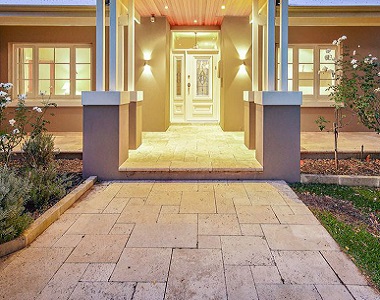⭐⭐⭐⭐⭐ AUSTRALIA’S LARGEST RANGE OF NATURAL STONE PAVERS ⭐⭐⭐⭐⭐
⭐⭐⭐⭐⭐ AUSTRALIA’S LARGEST RANGE OF NATURAL STONE PAVERS ⭐⭐⭐⭐⭐
FAQ:
A: Travertine is a natural stone that belongs to the limestone family, typically found in deposits near warm or hot springs. It is sometimes referred to as Travertine Limestone or Travertine Marble, although it is neither true limestone nor marble. Historically, travertine has been a favored building material, especially in ancient Rome, where it was used in iconic structures like the Colosseum and the Trevi Fountain.
In contemporary applications, travertine is most commonly used for a variety of purposes, including pool decks, patios, countertops, flooring both internally and externally, showers as well as for exterior decor. Its unique properties, such as its ability to remain cool underfoot and its aesthetic appeal, make it a popular choice for both indoor and outdoor spaces

A: Travertine Pavers are 100% natural stone pavers available in various sizes and patterns, typically measuring 30mm thick but we also have some premium Denizli Ivory at 20mm thickness. They are an excellent choice for outdoor applications, particularly for pool decks, patios, and driveways.
These pavers are known for their durability and aesthetic appeal, making them a popular option for enhancing outdoor spaces. Their natural texture and colors can complement a variety of design styles, providing a warm and inviting atmosphere. Additionally, travertine pavers are resistant to heat, making them comfortable to walk on even in sunny weather.
A: Travertine Tiles are 100% natural stone tiles that come in a variety of sizes and patterns, with the French pattern being a popular choice. Typically measuring 12mm thick, these tiles are suitable for a range of applications, including pool decks, patios, and internal floor tiles.
Known for their beauty and durability, travertine tiles offer a timeless aesthetic that can enhance both indoor and outdoor spaces. Their unique textures and colors add character and warmth to any environment, making them a favored option for homeowners and designers alike. Additionally, travertine tiles are versatile enough to be used in various design styles, adding elegance to kitchens, bathrooms, and living areas.
A: Tumbled Travertine Pavers are among the best materials for use around pool decks, patios, driveways, or walkways due to several key advantages:

A: Travertine Pavers are sourced primarily from Turkey, which is renowned for its high-quality travertine reserves. The travertine from Turkey is highly regarded and is the preferred choice for architects and designers in countries such as Italy, Iran, and Mexico.
The exceptional quality of Turkish travertine is attributed to its unique geological formation and the skilled craftsmanship involved in its extraction and processing. This makes Turkish travertine pavers not only visually appealing but also durable and reliable for various applications, enhancing their popularity in the global market.
A: The industry standard for Travertine Pavers is typically 30mm (1.25 inches) thick, although there are also options available at 20mm (approximately 0.79 inches) thick. For specific projects, custom orders can be made for thicker pavers if needed
This thickness is optimal for ensuring durability and stability, making travertine pavers suitable for various applications, including outdoor settings like pool decks and patios. The higher thickness also contributes to their resistance to cracking compared to thinner materials.
A: Travertine typically comes in one of three finishes, each offering a distinct appearance and texture:
Each finish enhances the natural beauty of travertine, allowing homeowners and designers to choose the right look for their specific needs and preferences.
You state that you have one of the Lowest Breakage Percentages in the Market?
A: Because we are in control of our Travertine Pavers from the factory directly to you. We do not import low quality materials and we certainly do not try to sell it to our clients. In addition, we state at most a mere 5% breakage while all other suppliers in the market state anywhere between 10% to 15%. That is by itself an important amount of savings to you.
A: Yes, we conduct a thorough final inspection of all pallets before they leave our warehouse. Our inspection process includes:
We take all necessary measures to ensure that the travertine arrives in the best possible shape at your location. Our commitment to quality means we do not ship low-quality or poor-condition travertine, providing you with peace of mind regarding your purchase.

A: We have a 21-day return policy for unused materials. The product must be returned in its entirety, in its original form, and in the same condition as when it arrived at the original destination and must not have been installed, removed and then returned. By “original form,” we mean in its natural state (not sealed or previously installed). By “in the same condition as when it arrived,” we mean that if the Travertine was delivered on a pallet or a crate, the material must be returned to us packaged and secured on said pallet or crate. Of course you can remove the Travertine upon arrival and inspect it. We encourage you to do so.
If there is a problem with the order, and it is our mistake, we will replace the products at our expense or offer you a refund. Simple as that. You are only liable for your freight costs.
A: Yes we do impose restocking fees on returned material that is in excess of your requirements. We also reserve the right to wether or not we accept your return materials ie special orders will NOT be accepted as returns under any circumstances.
A: Only OVERSEAS Residents are exempt from paying a goods and services tax.

A: Yes, we offer high-resolution pictures of the actual lot of travertine upon request. Our process includes:
This approach helps you make an informed decision by giving you a clear visual representation of the travertine you are considering. Feel free to reach out if you’d like to see images of a specific lot!
A: Yes, Travertine Pavers are known for their high durability. Having existed in nature for thousands of years, travertine has proven its resilience over time. Here are some key points regarding their durability:
This durability is one of the primary reasons many people choose travertine over alternative paving materials, ensuring a long-lasting and attractive surface for their projects.
A: Yes, Travertine Pavers can be effectively used in cold weather climates, provided they are properly installed and are of premium grade. Here’s what you need to know:
For optimal results in cold weather, we recommend using Flexbond Crack Prevention Mortar during installation. This ensures your travertine pavers remain durable and visually appealing in various weather conditions.
A: Yes, travertine can be effectively used around salt water pools, provided that appropriate measures are taken to protect it. Here are some important considerations:
By taking these precautions, travertine can maintain its beauty and durability in a salt water pool environment.
A: All of our Travertine products are sold either by the piece as is pool coping OR by the square meter if tiles or pavers. The Travertine is securely packed in these crates to prevent breakage during transit, therefore modifying the crates will greatly increase the likelihood of damage during shipment and cannot be done.
Our French Pattern Travertine Pavers typically contain 20m2 per crate.
Our French Pattern Travertine Tiles typically contain 35m2 per crate.
Our 406mm x 610mm x 30mm thick Travertine Pool Coping typically contains 120pcs per crate.

A: For areas around your swimming pool deck and other wet areas, Tumbled Travertine Pavers are the best choice. Here’s why:
Choosing Tumbled Travertine Pavers ensures both safety and aesthetic appeal for your outdoor spaces, making them a smart option for any poolside or wet area application.
A: For your driveway, the 610mm x 406mm x 30mm Travertine Pavers are the ideal choice. Here’s why:
Choosing the right size of travertine pavers for your driveway ensures both functionality and longevity, providing a beautiful and resilient surface for your vehicle.
A: No, it is not strictly necessary to seal travertine; however, sealing can enhance its natural beauty and splendor. Here are some key points to consider:
In summary, while sealing is not mandatory, it is a beneficial practice that can prolong the life and appearance of your travertine surfaces.
A:
By following these steps, you can maintain the beauty and integrity of your travertine surfaces for years to come!
A: Removing stains from travertine can be effectively managed with the right techniques. Here’s how to tackle common stains:
By following these methods, you can effectively remove stains and maintain the beauty of your travertine surfaces!

A: No, it is not recommended to spray bleach on travertine for cleaning purposes. Here’s why:
In summary, while bleach might seem like a quick solution, it’s best to avoid it for cleaning travertine. Instead, opt for products that are safe and effective for maintaining the beauty of your stone surfaces.
A: Used for both patios and pool decks, the French Pattern is an old-world style pattern used for hundreds of years. It contains four sizes within the pattern, comprising 16 square feet per set. Each set consists of (2) 16″x24″ pavers, (4) 16″x16″ pavers, (2) 16″x8″ pavers and (4) 8″x8″ pavers.
A: Travertine Pavers can be installed over existing concrete or asphalt as long as the driveway is in reasonably good condition. To ensure an adequate foundation for the Travertine, the existing driveway should be inspected and repaired as necessary. Cracks, chips, holes and other surface issues should be repaired in order to achieve a flat surface and to prevent breakage of the Travertine in the future.
A: It is reasonable to order an additional 10% material, which can be used in the case of cuts, turning radius or breakage. Remember, Travertine shades and colors will vary from pallet to pallet, especially if you need to order more years from now. It is a great idea to have extra material on hand in case you need to change out a paver down the road.
A: Yes this MUST BE DONE. Your creativity is given free reign when ordering from US!
A: Not really. Because Travertine is a natural stone, no two pieces are the same. Natural minerals are deposited randomly in each slab of stone, which means there will be naturally occurring differences in color and pattern for each cut paver.
What is the average cost of Travertine Pavers?
What is the average cost of Travertine Pool Coping (bullnose) per linear mtr?
A: The price depends on the color, quality and size of the material. Our premium quality Travertine Pavers could range anywhere from $49 to $89 per m2. Prices for Travertine Pool Coping (bullnose) are approximately $38.00 per linear mtr. Natural stone tiles and Travertine Tiles start at $46 per square mtr.
A: Tumbled Travertine Pavers are ideal for pool decks. They have numerous advantages over other materials in the marketplace. To summarize a few: Tumbled Travertine Pavers are heat resistant, they won’t burn your feet in hot summer months, they absorb water to help prevent slips and also help prevent flooding.

A: The main colors found in Travertine Pavers are: Ivory (off-white, beige, tan color) Walnut (very light brown) Noche (brown) and Gold. Occasionally, you can find red, blue, and gray tones.
A: This used to be one of the most popular questions on travertine. Travertine has a very high compressive strength, much higher than brick pavers or cement pavers, at around 8000 PSI. In addition, there are many examples of travertine used in the ancient cities of Rome in Italy and Ephesus in Turkey. The travertine is still intact after more than 2000 years of use. That, by itself, is a big statement.
A: Yes. Travertine Pavers will not absorb the heat from the sun outdoors and will not burn your feet during the hot summer months.
A: Stone Pavers offers shipping to all states in the Australia and to the Asia and South East Asia in general.aribbean. We have great rates for shipping either to a depot OR door to door within Australia.
A: Always make sure you have downloaded the most recent version of your internet browser (i.e. Internet Explorer, Firefox, Chrome, Safari). Older versions of Internet Explorer are not compatible with this website; text will most likely be jumbled and links will not work. Keeping your browser up to date will also help you avoid security risks that arise when using an old browser.




